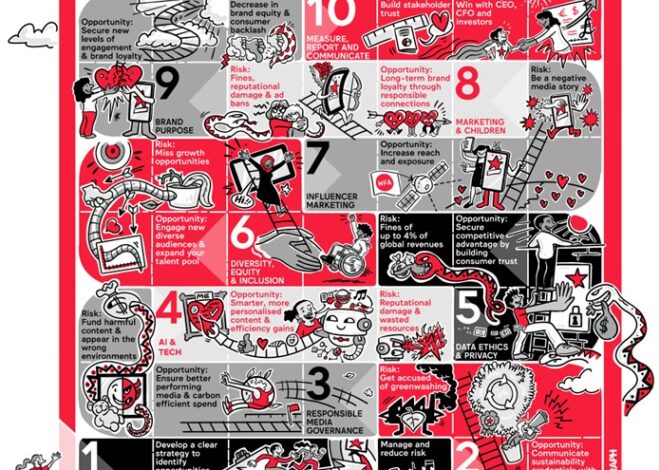
Dr. Anastasia Kārkliņa Gabriel, Author of Cultural Intelligence for Marketers, Shares How Brands Reflect Culture and Shape Societal Values …
Dr. Anastasia Kārkliņa Gabriel believes that brands reflect culture and actively shape societal norms and values. Her new book, Cultural Intelligence for Marketers: Building an Inclusive Marketing Strategy (Kogan Page, March 26, 2024), demonstrates how marketers can create programs that resonate effectively with audiences and meaningfully impact society.

Her book is devoted to helping marketers view culture more critically and act on that cultural knowledge to find answers for their brands and businesses. Dr. Gabriel says her goal is to enable brands to “ignite cultural innovation and leverage the power of media for good.”
As a cultural theorist, strategist, and longtime social activist, Dr. Anastasia Kārkliņa Gabriel brings a unique perspective to the field of marketing. Her extensive experience in understanding and navigating cultural dynamics allows her to provide a comprehensive framework for leveraging the power of culture in marketing.
Dr. Gabriel clarifies that even marketing a product as uncomplicated as mayonnaise taps into underlying cultural ideologies that shape ‘who we are, how we live, whom we love, and what we value.’ This underscores the crucial need for marketers to understand and leverage cultural intelligence in their strategies.
She states, “Every marketing strategy, every campaign, and every creative ad is an opportunity to make a meaningful impact, not only on the business but on society at large.”
She believes that marketing is a form of mass media, much like pop culture or entertainment, in that it is tremendously influential in shaping our perceptions, beliefs, and societal norms.
To learn more from Dr. Anastasia Kārkliņa Gabriel about how brands can ignite cultural innovation, watch the video interview on Internationalist Marketing TV (IMTV) on YouTube by CLICKING HERE.

CULTURAL FLUENCY
She further defines cultural intelligence as an ongoing practice of analyzing trends, movements, and social forces, evaluating their cultural significance and commercial implications to achieve strategic outcomes that drive business forward and transform culture for the better.
She demonstrates how this thinking provides the foundation for cultural fluency, or a brand’s capacity to engage in culture with resonance, integrity, and measurable impact. It marks the difference between brands within a culture and those that become an integral, valued part of the cultural conversation—and thrive.
The book also provides a comprehensive culture-strategy-innovation model with four foundational pillars—the 4Cs:
- Culture. How is the brand engaging with and leveraging relevant cultural movements, moments, and trends?
- Communication. How inclusive and sensitive is the brand in transmitting specific messaging to its target audiences?
- Critical consciousness. How does the marketing strategy integrate and implement the principles of equity and inclusivity?
- Community. How does the brand contribute to the cultural communities and audiences it targets?
She emphasizes, “Inclusivity, cultural representation, and social responsibility are the future of marketing strategy. Marketers can either embrace these things and step into this future now or scramble around when it arrives. The choice is ours.”

Listen to Dr. Anastasia Kārkliņa Gabriel discuss how brands can ignite cultural innovation and leverage the power of media for good, and to The Internationalist’s entire Trendsetters podcast series here on iHeartRadio’s Spreaker or wherever you download your podcasts.
In our conversation, we discuss the following:
- How do you define cultural intelligence? How do you develop it? Why is it important to business…
- Your book focuses on how brands reflect culture and actively shape societal norms and values. Can you talk a little more about that…
- You begin Cultural Intelligence for Marketers by redefining brand success and discussing what’s not working. Can you elaborate?
- Tell us about your 4Cs as tools for advanced Cultural Insights.
- How do you recommend a marketer start to identify the right cultural narrative for a brand?
- You also talk about brand accountability. What does that mean in the context of Cultural Intelligence?
- How do you integrate this work with notions of brand purpose today?
- If cultural change is continual, how can brands stay relevant?
- Would you give us some examples of brands that “get it right”?
- You also mention how your work helps brands ignite cultural innovation and leverage the power of media for good. Tell us more about using “the power of media for good.”
- What is the most important thing for a marketer to consider regarding cultural intelligence?
“This is not a typical business book, and it shouldn’t be. Cultural Intelligence for Marketers provides the frames we need to attune our understanding of contemporary marketing by accounting for the implicit and unintended consequences that result from brands that seek to harness the power of culture by engaging in it.” – Dr. Marcus Collins, Marketing Professor, the Ross School of Business, University of Michigan; Bestselling author, For the Culture; Former Head of Strategy, Wieden+Kennedy, New York

Dr. Anastasia Kārkliņa Gabriel is a cultural theorist, writer, social critic, and strategist specializing in inclusivity within marketing, media, and tech. Currently a senior insights lead at Reddit, she earned her doctorate in cultural studies from Duke University and has consulted for the world’s top brands, including Nike, Samsung, Disney, Ulta Beauty, and AMEX, at agencies like Wieden+Kennedy, Dentsu Creative, and McCann, among others. A lifelong activist, Dr. Gabriel helps brands ignite cultural innovation and leverage the power of media for good. Her insights have been featured in the American Marketing Association (AMA), the Association of National Advertisers (ANA), WARC, Advertising Week, Wall Street Journal, New York Times, Washington Post, and Teen Vogue.



